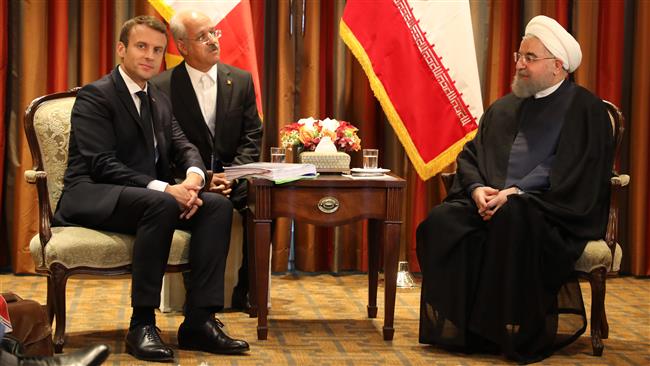Iran’s rift with France, which opened this month with a statement by French President Emmanuel Macron about Tehran’s ballistic missiles, widened on Thursday.
Foreign Ministry spokesman Bahram Qassemi said on Thursday, “Unfortunately, it seems like France has a one-sided and biased view towards the ongoing crises and humanitarian catastrophes in the Middle East.” He asserted that the position fuels regional conflicts, “whether intentionally or unintentionally”.
Qassemi was responding to comments by French Foreign Minister Jean-Yves Le Drian, who expressed concerns earlier in the day about Iran’s “hegemonic” intentions in the Middle East.
“I’m thinking specifically about Iran’s ballistic program,” Le Drian remarked during a joint press conference with Saudi counterpart Adel al-Jubeir during a trip to Riyadh.
Iran has been courting the European Union and its members to guard against US withdrawal from the July 2015 nuclear agreement between Tehran and the 5+1 Powers (US, UK, France, Germany, China, and Russia), and to pursue economic recovery despite a tightening of Washington’s sanctions.
But last week Macron made a sudden trip to Saudi Arabia, Iran’s rival in the Middle East. He claimed that Tehran was behind the firing of a missile by Yemen’s Ansar Allah (Houthi) insurgents on Riyadh International Airport, and continued, “There are extremely strong concerns about Iran. There are negotiations we need to start on Iran’s ballistic missiles.”
Iran’s ballistic missile testing is outside the scope of the nuclear deal, but the US is seeking a renegotiation to cover the research and development. France is opposed to reopening talks on the deal but is seeking an accord on the ballistic missiles alongside the Joint Comprehensive Plan of Action.
See Iran Daily, Nov 10: France Points to Negotiation of Missiles Alongside Nuclear Deal
Citing Saudi intervention in Yemen’s civil war as an example, Qassemi said on Thursday that France’s unconditional support made Riyadh and its regional partners more “insolent” in creating new conflicts. He called for a “realistic and responsible” approach by Paris.
The tension has been compounded by the sudden resignation of Lebanese Prime Minister Saad Hariri during a trip to Saudi Arabia two weeks ago, collapsing the Lebanese Government which includes Iran’s ally Hezbollah.
Some Lebanese officials and Iran accused Saudi Arabia of detaining Hariri. The Saudis have asserted that Hezbollah and the Islamic Republic are pursuing “acts of war”.
Earlier this week France offered to host Hariri if he moved from Riyadh.
The rift may also threaten a flagship project for the economic recovery sought by Iran since the implementation of the nuclear agreement. Earlier this week the French energy giant Total said a $4.8 billion gas deal, agreed in July, might be suspended — although it cited the prospect of tougher US sanctions, rather than a French-Iranian dispute, as the cause.

